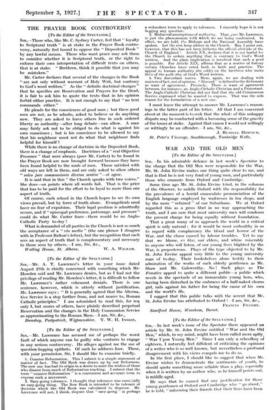THE PRAYER BOOK CONTROVERSY
[To the Editor of the SPECTATOR.]
SIR,—Those who, like Mr. C. Sydney Carter, feel that " loyalty
to Scriptural truth " is at stake in the Prayer Book contro- versy, naturally feel bound to oppose the " Deposited Book " by any lawful means. Those who want peace may ask them to consider whether it is Scriptural truth, or the right to enforce their own interpretation of difficult texts on others, that is at stake. " Brethren, think it possible that you may be mistaken."
• Mr. Carter declares that several of the changes in the Book " are not only without warrant of Holy Writ, but contrary to God's word written." As the " definite doctrinal changes " that he specifies are Reservation and Prayers for the Dead, it is fair to ask him to quote the texts that in his opinion forbid either practice. It is not enough to say that " no text commands either."
He pleads for the consciences of good men ; but these good men are not, as he admits, asked to believe or do anything new. They are asked to leave others free in such ordered liberty as authority—after long debate—can allow. A man may fairly ask not to be obliged to do what is against his own conscience ; but is his conscience to be allowed to say that his neighbour must not do what that neighbour finds helpful for himself ?
While there is no change of doctrine in the Deposited Book, there is a change of emphasis. Doctrines of a " real Objective Presence " that were always (pace Mr. Carter) to be found in the Prayer Book are now brought forward because they have been found helpful to the souls of men. Those satisfied with old ways are left in them, and are only asked to allow others salvo jure communions diversa sentire "—et agere.
It is said that in this " the Church speaks with two voices." She does—on points where all words fail. That is the price that has to be paid for the effort to be loyal to more than one aspect of truth.
Of course, each school in the Church hopes to see its own views prevail, but by force of truth alone. Evangelicals need have no fear of expulsion. Their legal position is admittedly secure, and if " episcopal preference, patronage, and pressure" could do what Mr. Carter fears—there would be no Anglo- Catholic Party to-day !
What is demanded of all parties in the Church is not so much the acceptance of a " via media " (the one phrase I disagree with in Professor Relton's letter), but the recognition that each sees an aspect of truth that is complementary and necessary to those seen by others.—I am, Sir, &c.,










































 Previous page
Previous page